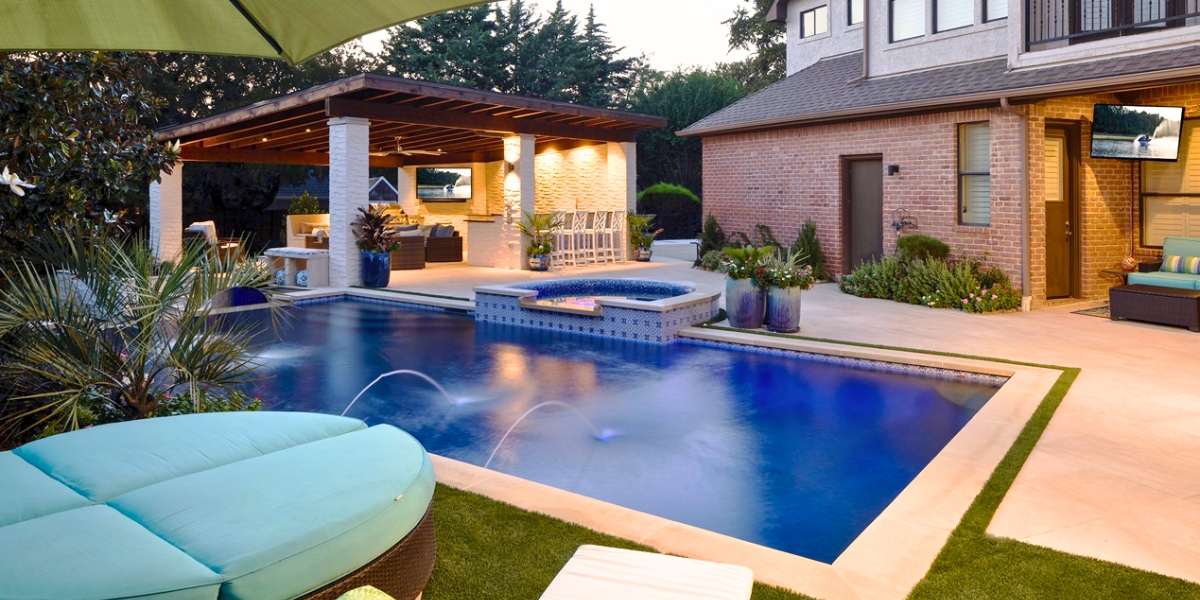
Salt Water Pool vs Chlorine Pool: Which is Better?
Our clients often ask us what the differences are between a salt water pool vs chlorine pool. Each pool system comes with its own pros and cons and there’s several misconceptions about the salt water pool vs chlorine debate too.
This blog will highlight the key differences, costs, and misconceptions to consider when choosing between a salt pool vs chlorine pool.
Salt vs Chlorine Pool Misconceptions
Before deciding between a salt water pool vs chlorine pool, many assume that a salt water pool is better simply because they don’t use chlorine.
Here’s the catch: Salt water pools aren’t chlorine-free. There’s significantly less chlorine in a salt water pool vs chlorine pool. Instead, they use a filtration system with chlorine generators to produce the necessary chlorine to clean the pool.
In the chlorine pool, you add the chlorine and other chemicals into the pool directly. In the salt water pool, you add pool-grade salt to the water, and the chlorine generator chemically converts the salt into chlorine to sanitize the pool.
Still, there is a big difference in the amount of chlorine used in a salt water pool vs chlorine. That’s why a salt water pool doesn’t smell like a chlorine pool and when it slips into your mouth, it doesn’t taste like chlorine. That’s also why you don’t feel the chlorine sting when water gets into your eyes.
Salt Water Pool Vs Chlorine Chemical Effects
Both pool types have chemicals, and substances in both pools have different effects. So, when comparing the salt water vs chlorine pool chemical effects, there are some things to keep in mind.
Chlorine pools rely on not just chlorine, but additional chemicals that can irritate your eyes, throat and skin. These chemicals can also be hard on your hair and hair coloring. They can discolor swimsuits, towels, curtains, and the fabric of outdoor furniture. Plus, chlorine has more strict storage requirements that can be harder for people with limited space or young children.
Salt water pool owners report a nicer feeling on their skin from the salt vs chlorine pool chemicals, but salt water is corrosive to metal and natural stone.
That means that water droplets from a salt water pool can corrode nearby metal outdoor furniture, outdoor kitchen grills, natural stone paving and other features over time. Natural stone can of course be sealed to prevent the corrosive effects, but it’s something people may not consider when comparing salt water vs chlorine pools.
Salt water can corrode other pool features and pool accessories, including:
- Metal railings
- Water heater components
- Ladders and ladder hand rails made of metal
- Nearby metal gates or fencing
- Fixtures made of metal on gates or fencing
- Diving board components
- Above ground pools with metal walls
- Plaster finishes on concrete pools
Fiberglass pools are more resistant to the chemical effects of the salt, but they can also be professionally sealed to accommodate a salt water system.
Cost Comparison of Buying a Salt Pool vs Chlorine Pool
Of course, there are also cost differences of a salt pool vs chlorine pool. On one hand pool-grade salt costs significantly less than the chemicals needed to keep a chlorine pool operating with crystal-clear water. Although it’s not necessary, many people run their chlorine filtration systems around the clock to achieve perfect pool clarity.
Despite the need for salt water pool filtration systems to run around the clock, salt water pools are easier to maintain on a day-to-day basis and they’re much cheaper to operate.
However, salt water pools cost more upfront compared to traditional chlorine pools. A salt water system’s chlorine generator is an expensive upfront purchase, and they need replacing every three to seven years.
Speak To A Professional Today!
Are you ready to elevate your outdoor living experience with custom pool structures that inspire and delight?
Get a Free Estimate Before Choosing a Salt Water Pool vs Chlorine Pool
When comparing these two pool types, pool owners frequently consider the benefits, costs, and maintenance systems to keep their pool crystal clear and sanitized. Ultimately, the decision will be yours, but you don’t have to do it alone.
Here at Advance Pools, we can help you through the decision-making process. Our pool contractors can listen to your vision, create a plan for your outdoor oasis, and discuss which system may be best for your unique needs. Schedule a free consultation today!
